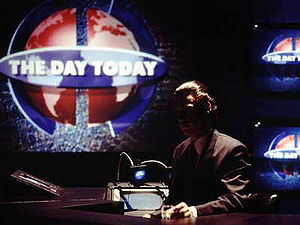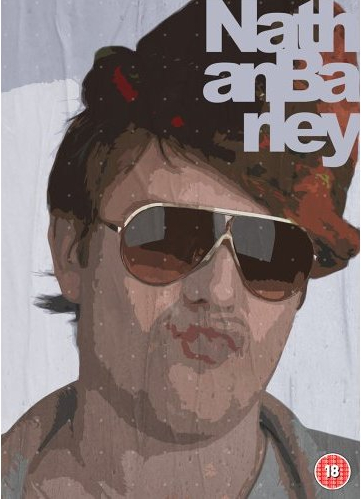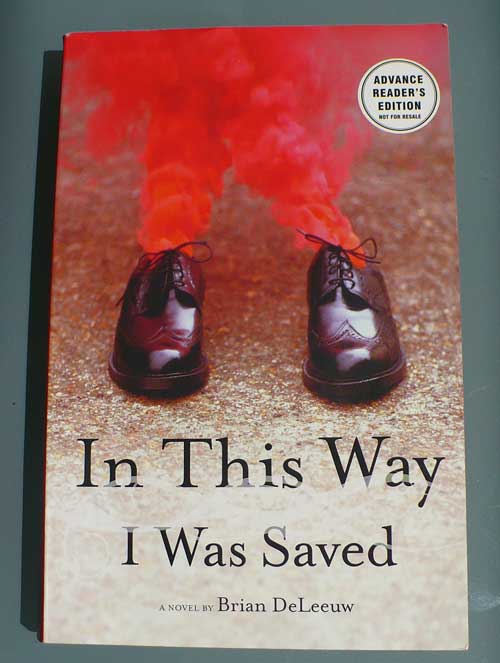 TV
TV In Which We Hold Ourselves Down
 Wednesday, August 12, 2009 at 8:16AM
Wednesday, August 12, 2009 at 8:16AM 
Unbelievably Sick
by BRIAN DELEEUW
Chris Morris is the kind of artist whose work tends to piss off people who haven't even seen it. The best example of this occurred in 2001, after the "Paedogeddon!" special episode of his Brass Eye series aired on UK's Channel 4. Like The Colbert Report and The Daily Show, Brass Eye is a satire of the news media's pomposity and hypocrisy, and in 2000 the British press — especially tabloids like News of the World, The Daily Star, and The Daily Mail — had whipped itself into a self-aggrandizing and grotesque froth over a few highly-publicized cases of pedophilia, exploiting the victims and their families and emotionally manipulating the public. (News of the World — which later "broke" the Michael Phelps bong photos, as well as the infinitely more entertaining Max Mosley S&M scandal — was especially excitable, pursuing a name-and-shame campaign to "out" alleged pedophiles, which led to mistaken-identity mob pursuit of entirely innocent people as well as the vandalizing of a pediatrician's home.)
Brass Eye responded with this:
Perhaps jealous that she wasn't asked to make an ass of herself on the show like her Labour colleague Syd Rapson, MP Beverley Hughes quickly responded by repeatedly criticizing the episode, calling it "unbelievably sick," as did Education Secretary David Blunkett and Culture Secretary Tessa Jowell, despite the fact that none of them had ever actually seen the episode.
The Daily Star excoriated Morris directly opposite a leering item about the singer Charlotte Church's breasts (Church was fifteen at the time).
The Daily Mail did one better by running an outraged anti-Morris piece in the same issue as close-up photos of Princesses Beatrice and Eugenie in their bikinis (the Princesses were thirteen and eleven). All of these reactions played out as though the show had continued on in real life, which is one of the best ways to measure the success of a satire. (Here's the Guardian's definitive wrap-up of the whole affair.)

Before "Paedogeddon!" Brass Eye's original six 1997 episodes had already taken on "Animals," "Drugs," "Science," "Sex," "Crime," and "Decline." The target is the "in-depth" topical news special; the tone is alternately (or sometimes simultaneously) sensationalistic and moralizing; the aesthetic is frantic, bombastic, over-produced. Aside from Morris's presenter alter-ego, recurring "reporters" like Ted Maul and Austin Tasseltine, and pointlessly over-the-top graphics, a common feature of the show is enlisting politicians and C-list celebrities to speak on behalf of absurd causes, like "F.U.K.D. and B.O.M.B.D." ("Free the United Kingdom from Drugs and British Opposition to Metabolically Bisturbile Drugs," natch) and "W.O.F.D.C.A.P, incorporating A.A.A.A.A.A.A.Z." ("World Organization for Decreasing Captive Animal Problems, incorporating Against Animal Anger and Autocausal Abuse Atrocities in Zoos").
My favorite example is when a procession of M.P.'s and entertainment personalities are trotted out to issue a grave warning against the dangers of "cake," a "made-up drug" (meaning made out of chemicals rather than plants, of course) on its way to Britain from the "boom raves" of Prague.
As each episode careens at high speed through interviews, panels, investigative "reports," and pure nonsense, mostly the target is the English language itself, which Morris contorts into bizarre and fantastical shapes. (A broke man is "out of wampum" because he "spazzed it all on a horse"; Jas Mann is "the biff-boff and the puff pastry hangman"; a cow, fired out of a canon, "lands in a crunched-up bone-heap.")
The density of the linguistic barrage is disorienting, but it makes sense because Morris got his start on radio -- where language is all you've got — with On the Hour, a spoof of BBC-style radio news gravitas, and Blue Jam, a collection of head-fuck sketches and ambient music. On the Hour's twelve episodes aired on BBC 4 in 1991-1992 and, among other things, introduced Steve Coogan's character Alan Partridge alongside Morris's all-knowing buffoon of a presenter.
The Day Today pushed On the Hour's style and delivery onto the TV screen, reminding us all that Fact x Importance = News.
Aided by Partridge, android-like (but strangely sexy?) financial expert Collaterlie Sisters, and screw-up economic reporter Peter O'Hanra-hanrahan, among others, Morris bullies his guests, humiliates his reporters, and, in one case, incites a war between Hong Kong and Australia. Here he is covering the IRA's bomb-dog campaign:
Collaterlie Sisters:
Peter O'Hanra-hanrahan:
The Day Today preceded even the Craig Kilborn-helmed version of The Daily Show by over two years, but, while his goal of puncturing the balloon of media self-importance was similar to Lizz Winstead's, Morris had little interest in continuing to comment on daily events after the show's initial six-episode run. Instead, he moved on to attack the sketch comedy form, producing the psych-out extravaganza Jam, which aims to repulse and confuse its audience as much as to entertain it. I think the show is hilarious, but I sometimes have trouble convincing people this is comedy at all.

The format is brief sketches, heavily tricked out with audio and visual effects and set (mostly) over ambient or downtempo music. The subjects include suicide:
stupid people:
and murdered children:
The stuff of comedy! But somehow here it is. It's difficult to reason how, exactly, but I think it has something to do with the precision of the language and the deadpan, almost morbid, delivery. (There's also the insane intros to each episode, which feature Jabberwocky-esque monologues running over some of Morris's most disturbing imagery.) But rather than running the risk of over-explaining, it's best to just watch and decide for yourself. Here's a few featuring one of my favorite recurring characters, a terminally bored doctor:
Jam was produced between the original six episodes of Brass Eye and the 2001 "Paedegeddon!" special. Since then, Morris directed the short film "My Wrongs #8245-8249 & 117," which is in the style of the less-fucked-up Jam sketches and which won a BAFTA for Best Short Film in 2003. He also starred on the terrible Channel 4 sitcom The IT Crowd and co-wrote the far-better — if a bit obvious — comedy Nathan Barley, also for Channel 4.

More intriguing is the news that he's finally found funding for his feature-length film project, Four Lions, a (fictional) comedy about homegrown British jihadis. Morris seems to be at his best when he's most "offensive," which bodes well for this movie, apparently the result of three years of research and extensive interviews within the British Muslim community. Will it be any good? I don't know, but I can't think of anybody else who would even try such a thing. The movie is scheduled for release in early 2010, which gives you about six months to catch up on all the rest of his work.
Brian DeLeeuw is the author of the novel In This Way I Was Saved, out now from Simon & Schuster. He is an editor at Tin House magazine, and he has written for This Recording about Judas Priest, the Tsukiji Fish Market, and dubstep.

Buy the book here.
"I'm Not Asleep" — Vivian Girls (mp3)
"Double Vision" — Vivian Girls (mp3)
"Out for the Sun" — Vivian Girls (mp3)

 brass eye,
brass eye,  brian deleeuw,
brian deleeuw,  chris morris
chris morris 






















































